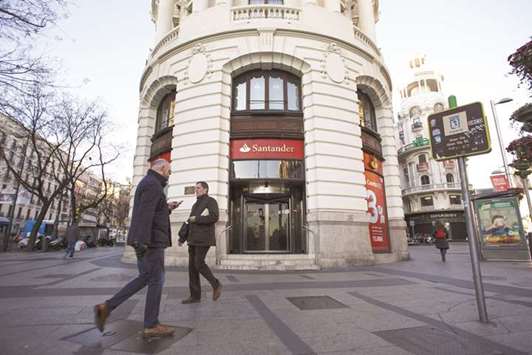Banco Santander, Spain’s biggest lender, bought minority stakes in three financial-technology firms as chairman Ana Botin makes machine learning a hallmark of her growth plan.
Santander InnoVentures is investing in Pixoneye and Curve, both based in the UK, and Gridspace, located in the US, according to a statement on Wednesday. Terms weren’t disclosed. The acquisitions bring the number of fintech firms in the bank’s portfolio to 15.
The $200mn fund is the most active bank-backed investment vehicle in fintech, according to CB Insights, a New York-based research firm. The latest crop shows how Santander InnoVentures is now hunting for fintech plays that utilise machine learning to better understand customer behaviour.
Pixoneye’s algorithms can build a profile of a consumer from photographs stored on his or her smartphone or other device, while Gridspace utilises artificial intelligence to analyse the sentiments of people on phone calls with customer service representatives. It will be easier to automate call centres if machines can adjust on the fly to frustrated or pleased consumers, said Mariano Belinky, Santander InnoVentures’ managing partner.
“This is the type of technology that can help us break the most costs out of customer services,” said Belinky, a former McKinsey & Co risk-management consultant who set up Santander InnoVentures with Botin’s blessing three years ago. “We’re looking for more specialised and focused solutions — AI with a purpose.”
About five years into the current wave of fintech startups, banks are under mounting pressure to show that they can integrate innovative technologies into their existing operations.
Beginning in January, new rules in the European Union will require banks to open their networks and databases to fintech startups to stimulate competition.
That means everything from payment-card providers to insurance apps will be able to access current accounts and challenge banks’ long-protected relationships with their customers. Santander invested in Curve to help prepare for this change: that company combines a consumer’s payment and credit cards onto one MasterCard, linked to a digital wallet.
Citigroup, Barclays and Banco Bilbao Vizcaya Argentaria have also been especially active in using accelerators and venture funds to find promising new business models. Corporate investments now account for more than a third of the funding for fintech startups worldwide, compared with 22% in March 2016, according to CB Insights.
At Santander, almost three-quarters of the companies in InnoVentures’ portfolio are at various stages of making their offerings available to the bank’s customers. Atlanta-based Kabbage, for example, originates loans for small-business borrowers in Santander’s UK unit.

Pedestrians pass a Banco Santander bank branch in Madrid. Santander InnoVentures is investing in Pixoneye and Curve, both based in the UK, and Gridspace, located in the US, according to a statement.
